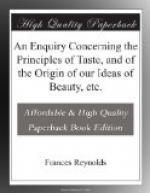As I imagine the difference in national beauty is marked by the difference in national morals, so, of course, must the difference of the opinions of individuals on the subject of beauty be. In fine, as the moral sense of mankind is coarse or refined, so will be their taste of beauty.
Of this I am certain, that true refinement is the effect of true virtue; that virtue is truth, and good; and that beauty dwells in them, and they in her.
CHAPTER III
On TASTE.
Taste seems to be an inherent impulsive tendency of the soul towards true good, given by nature to all alike, and which improves in its sentiment as the reasoning faculties improve in their knowledge of what is true good.
All the human faculties are, as one may say, constituents of the principle or faculty of taste. But its perception seems to be shared between the judgement and the imagination: to the former seems to belong the truth, or good, of an object of taste; to the latter its beauty or grace; and the stamina vitae, or radical principles of taste, exist, I imagine, in the natural affections of the soul.
What the impulsive spring is, which moves the affections invariably to perceive pleasure in the perception of good and beauty, and disgust in the perception of evil or deformity, I leave to my metaphysical readers to determine. I am afraid to give it an appellation so incongruous to the general idea of taste, as that of conscience.
Yet, however absurd it may appear, I will venture to say, that, if my readers will give themselves the trouble to analyse the grateful sensation or sentiment, we call taste i.e. their sentiment of what is truly good, beautiful, right, just, ornamental, honourable, &c. &c. they will find it to originate from, and end in, some moral or religious principle. Indeed, some objects (the highest in the scale of our perceptions of excellence) bring with them an immediate conviction of the truth of this assertion; witness the devotional sentiment which the view of the main ocean inspires; the rising and setting sun; the contemplation of the celestial orbs, &c. witness the noblest object of the creation, when viewed in his highest character. Does not the perception of human excellence immediately relate to the source of all excellence?
The general diffusion of intellectual light, throughout mankind, constitutes rationality; and the aggregated excellence, or light of rationality, constitutes morality. It is, I imagine, in this second or purified light, that taste begins to exist. It is at this period of cultivation that the mind begins to perceive its true good; that the natural affections rectify, methodize, and refine, in a word, become moral affections, through whose medium, i.e. the moral sense, the soul perceives every object of taste.




